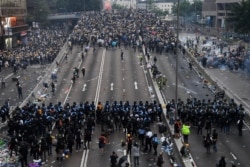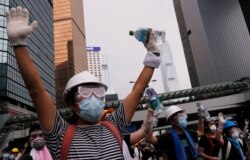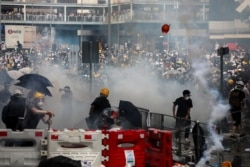VOA's Mandarin service contributed to this story.
The United States is encouraging all sides to exercise restraint as massive protests in Hong Kong took a violent turn Wednesday with police clashing with protesters who opposed a controversial extradition bill.
Officers wearing helmets and carrying shields lined up on streets, firing tear gas, rubber bullets and pepper spray to push back protesters, some of whom overturned barricades and threw objects at police. Hospital authorities said at least 72 people were injured.
The demonstrations forced the legislature to postpone Wednesday's session where lawmakers were scheduled to debate the proposed legislation.
The prospect of extradition to mainland China in particular, which has a substantially different legal system, has alarmed a wide cross section of Hong Kong — from international business groups to legal societies and pro-democracy parties.
Hoping for solution
In Washington, President Donald Trump said he was sure China and Hong Kong would be able to "work things out" after the mass protests turned violent.
"That was a million people. That was as big a demonstration as I've ever seen," Trump told reporters at the White House.
"I understand the reason for the demonstration but I'm sure they will be able to work it out. I hope they're going to be able to work it out with China," added Trump.
At the State Department, spokeswoman Morgan Ortagus encouraged all sides to refrain from violence.
"We think that these peaceful protests are incredibly important, and it's important for the Hong Kong government to respect these freedom of expressions, respect the right of people to peacefully assemble," Ortagus said Wednesday during a briefing.
Ortagus said people were protesting the proposed extradition legislation "because they don't want to be subjugated to the Chinese as it relates to some of their fundamental rights."
On Capitol Hill, members of the U.S. Senate spoke with VOA Wednesday about the protest.
“I think it’s very regrettable what mainland China is trying to do with that law against the people of HK and their autonomy, so I certainly understand the people of HK desire to maintain their autonomy. It’s unfortunate what mainland China is doing,” said Wisconsin Republican Sen. Ron Johnson.
“We certainly follow that and we are aware of challenges in regards to China’s failure to live up to all the commitments they made internationally to HK and to people of China,” said Sen. Ben Cardin, a Democrat from Maryland.
As protesters retreated to a nearby mall and elevated walkways, many said their resolve had not yet failed.
'This is our home'
"We are trying to protect Hong Kong. This is our home," said Raven Tse, a protester who had taken leave from work to attend.
She said she was "angry, sad, disappointed at the government" for failing to listen to protesters after hundreds of thousands took to the streets over the weekend.
Tse and her friend Tracey Lee, who both wore surgical masks and goggles, said they feared what the extradition law would mean for Hong Kong.
"We [won't] have any more freedom of speech. This is what is special about Hong Kong. This is why many people want to come to Hong Kong," Tse said.
As darkness gathered in Hong Kong, however, it appeared that protesters had lost significant ground to riot police who cleared successive areas around the Legislative Council.
Many people, however, remained around the edges of the protest. Some were militant student protesters while others were simply ordinary people showing their support.
Willing to keep fighting
Earlier, Laurel Lee told VOA she was attending the protests as a "backup team" to support those fighting on the front line.
"I get used to getting defeated so I am not disappointed if this time we get defeated again. We are ready to come back anytime," Lee said.
On Wednesday, hundreds of businesses shuttered their doors to allow employees to attend the protest while others said they would allow flexible working hours or sick days to be taken.
The protests were strongly reminiscent of the 2014 democracy protests, with democratic legislator Claudia Mo calling them "Umbrella 2.0."
"The young, they want what we call the evil law, the evil bill, to be scrapped altogether," Mo said.
"Just look at this people power, in particular, this young people power. [Chief Executive] Carrie Lam cannot pretend, 'Oh, there is nothing much happening that the young again, they don't understand what's going on.' "
Despite the mass protests, Lam continues to back the extradition bill.
Criticism abroad
The proposed changes to Hong Kong law have attracted criticism from the international community, including the United States. China accused the United States on Tuesday of interfering in its internal affairs.
Hong Kong, a former British colony, was granted special autonomy for 50 years after it returned to Chinese sovereignty in 1997. But many in Hong Kong are concerned that China is slowly encroaching on those rights and tightening its grip on the territory.
The so-called Umbrella Movement protests were launched in 2014 to demand the direct election of the city's top leader after China reneged on promises of universal suffrage by 2017. The protests ended without winning any concessions from the Hong Kong government.







